Emotional Intelligence Report - Leadership Skills, University Course
VerifiedAdded on 2022/11/14
|6
|1044
|236
Report
AI Summary
This report delves into the concept of emotional intelligence (EI) and its crucial role in effective leadership. Part 1 introduces EI as the ability to understand and manage one's emotions and how they influence decisions, referencing the work of Sara Canady and highlighting the three mental models: ability, mixed, and trait models. Part 2 provides practical strategies for developing EI, including self-awareness, self-regulation, motivation, and interpersonal skills, emphasizing their importance for leaders. The report also examines the significance of mental models in improving thinking abilities and problem-solving. Part 3 applies the concepts to a mixed model of EI, identifying the author's strengths in motivation and areas for growth in self-regulation, supported by references to relevant research.
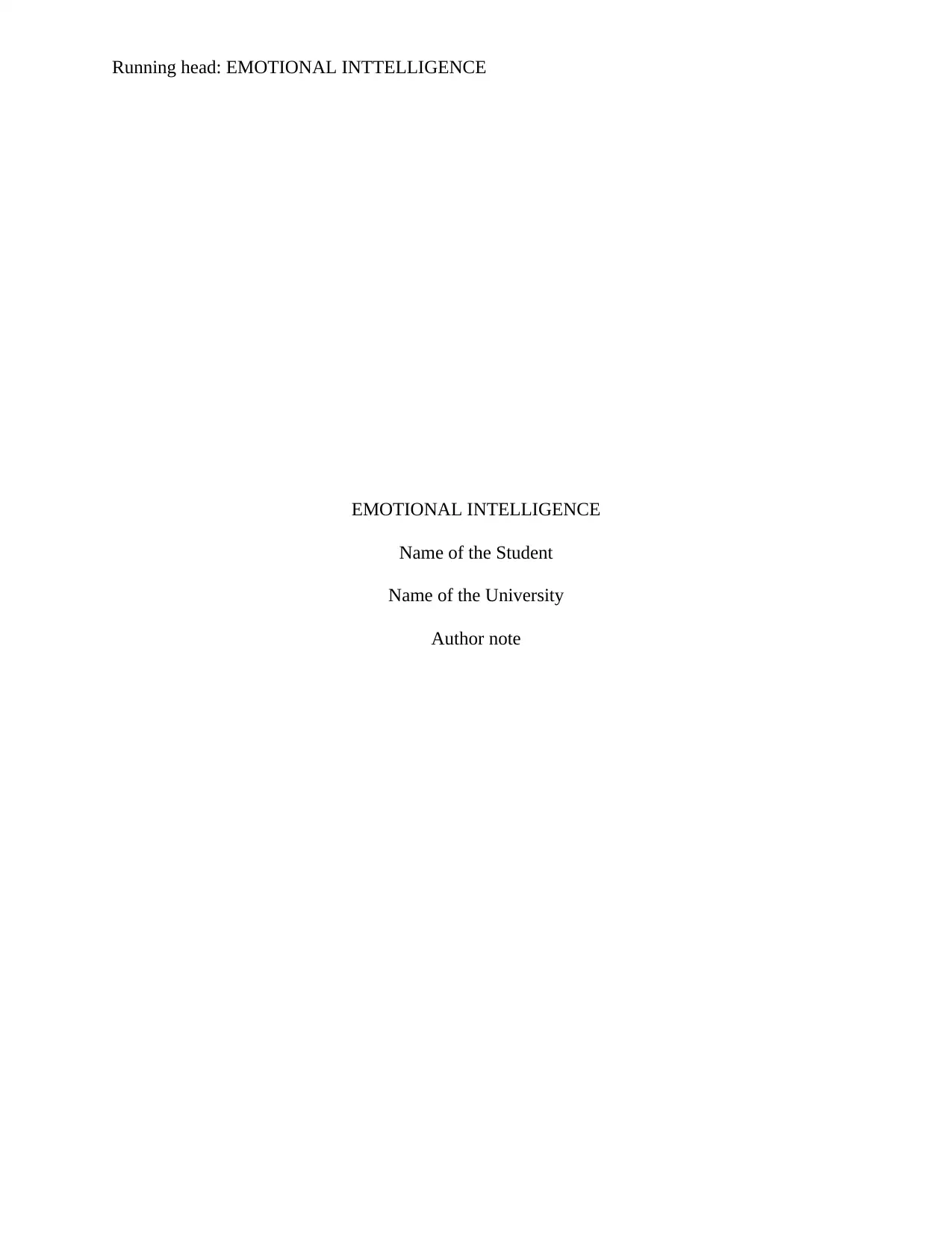
Running head: EMOTIONAL INTTELLIGENCE
EMOTIONAL INTELLIGENCE
Name of the Student
Name of the University
Author note
EMOTIONAL INTELLIGENCE
Name of the Student
Name of the University
Author note
Paraphrase This Document
Need a fresh take? Get an instant paraphrase of this document with our AI Paraphraser
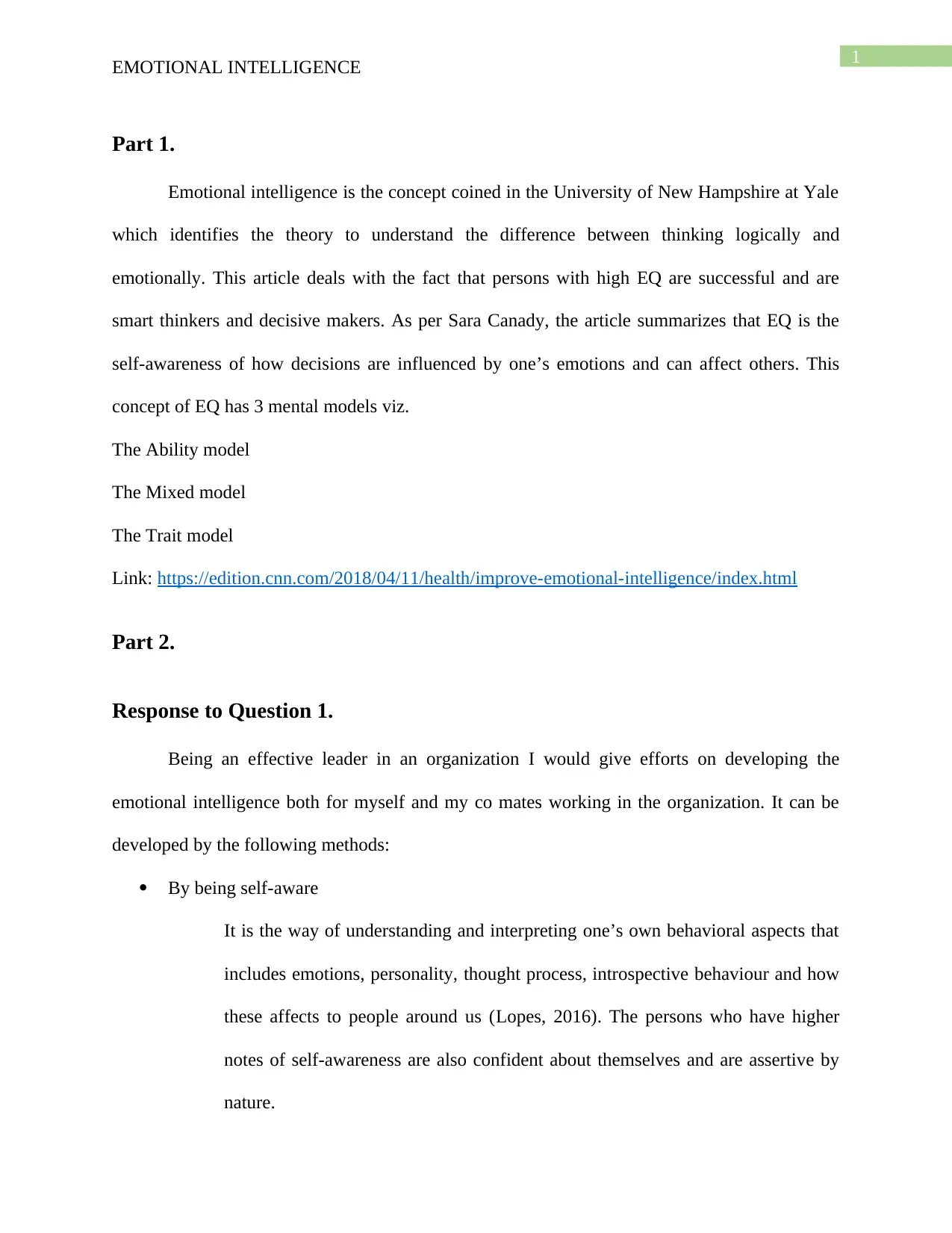
1
EMOTIONAL INTELLIGENCE
Part 1.
Emotional intelligence is the concept coined in the University of New Hampshire at Yale
which identifies the theory to understand the difference between thinking logically and
emotionally. This article deals with the fact that persons with high EQ are successful and are
smart thinkers and decisive makers. As per Sara Canady, the article summarizes that EQ is the
self-awareness of how decisions are influenced by one’s emotions and can affect others. This
concept of EQ has 3 mental models viz.
The Ability model
The Mixed model
The Trait model
Link: https://edition.cnn.com/2018/04/11/health/improve-emotional-intelligence/index.html
Part 2.
Response to Question 1.
Being an effective leader in an organization I would give efforts on developing the
emotional intelligence both for myself and my co mates working in the organization. It can be
developed by the following methods:
By being self-aware
It is the way of understanding and interpreting one’s own behavioral aspects that
includes emotions, personality, thought process, introspective behaviour and how
these affects to people around us (Lopes, 2016). The persons who have higher
notes of self-awareness are also confident about themselves and are assertive by
nature.
EMOTIONAL INTELLIGENCE
Part 1.
Emotional intelligence is the concept coined in the University of New Hampshire at Yale
which identifies the theory to understand the difference between thinking logically and
emotionally. This article deals with the fact that persons with high EQ are successful and are
smart thinkers and decisive makers. As per Sara Canady, the article summarizes that EQ is the
self-awareness of how decisions are influenced by one’s emotions and can affect others. This
concept of EQ has 3 mental models viz.
The Ability model
The Mixed model
The Trait model
Link: https://edition.cnn.com/2018/04/11/health/improve-emotional-intelligence/index.html
Part 2.
Response to Question 1.
Being an effective leader in an organization I would give efforts on developing the
emotional intelligence both for myself and my co mates working in the organization. It can be
developed by the following methods:
By being self-aware
It is the way of understanding and interpreting one’s own behavioral aspects that
includes emotions, personality, thought process, introspective behaviour and how
these affects to people around us (Lopes, 2016). The persons who have higher
notes of self-awareness are also confident about themselves and are assertive by
nature.
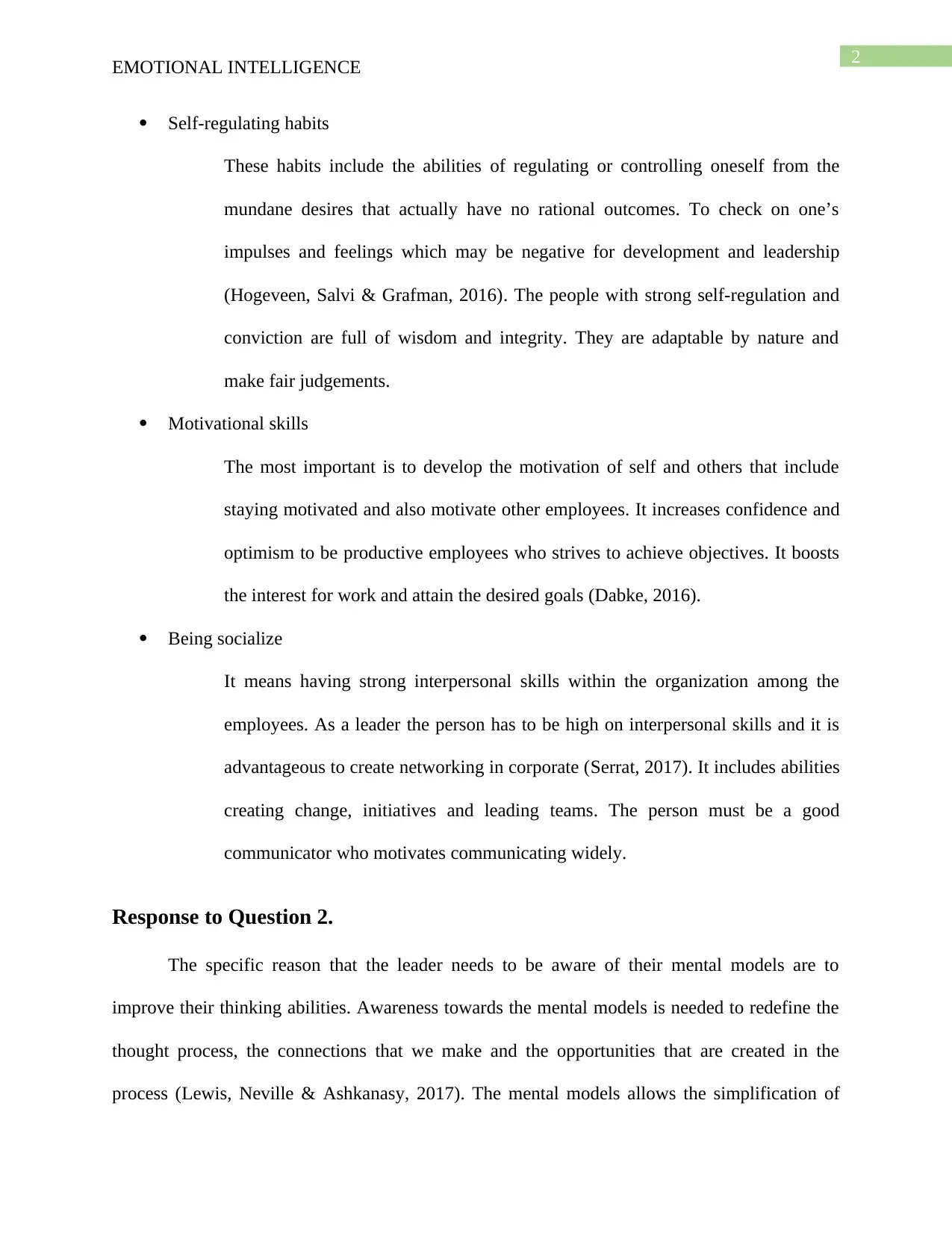
2
EMOTIONAL INTELLIGENCE
Self-regulating habits
These habits include the abilities of regulating or controlling oneself from the
mundane desires that actually have no rational outcomes. To check on one’s
impulses and feelings which may be negative for development and leadership
(Hogeveen, Salvi & Grafman, 2016). The people with strong self-regulation and
conviction are full of wisdom and integrity. They are adaptable by nature and
make fair judgements.
Motivational skills
The most important is to develop the motivation of self and others that include
staying motivated and also motivate other employees. It increases confidence and
optimism to be productive employees who strives to achieve objectives. It boosts
the interest for work and attain the desired goals (Dabke, 2016).
Being socialize
It means having strong interpersonal skills within the organization among the
employees. As a leader the person has to be high on interpersonal skills and it is
advantageous to create networking in corporate (Serrat, 2017). It includes abilities
creating change, initiatives and leading teams. The person must be a good
communicator who motivates communicating widely.
Response to Question 2.
The specific reason that the leader needs to be aware of their mental models are to
improve their thinking abilities. Awareness towards the mental models is needed to redefine the
thought process, the connections that we make and the opportunities that are created in the
process (Lewis, Neville & Ashkanasy, 2017). The mental models allows the simplification of
EMOTIONAL INTELLIGENCE
Self-regulating habits
These habits include the abilities of regulating or controlling oneself from the
mundane desires that actually have no rational outcomes. To check on one’s
impulses and feelings which may be negative for development and leadership
(Hogeveen, Salvi & Grafman, 2016). The people with strong self-regulation and
conviction are full of wisdom and integrity. They are adaptable by nature and
make fair judgements.
Motivational skills
The most important is to develop the motivation of self and others that include
staying motivated and also motivate other employees. It increases confidence and
optimism to be productive employees who strives to achieve objectives. It boosts
the interest for work and attain the desired goals (Dabke, 2016).
Being socialize
It means having strong interpersonal skills within the organization among the
employees. As a leader the person has to be high on interpersonal skills and it is
advantageous to create networking in corporate (Serrat, 2017). It includes abilities
creating change, initiatives and leading teams. The person must be a good
communicator who motivates communicating widely.
Response to Question 2.
The specific reason that the leader needs to be aware of their mental models are to
improve their thinking abilities. Awareness towards the mental models is needed to redefine the
thought process, the connections that we make and the opportunities that are created in the
process (Lewis, Neville & Ashkanasy, 2017). The mental models allows the simplification of
⊘ This is a preview!⊘
Do you want full access?
Subscribe today to unlock all pages.

Trusted by 1+ million students worldwide
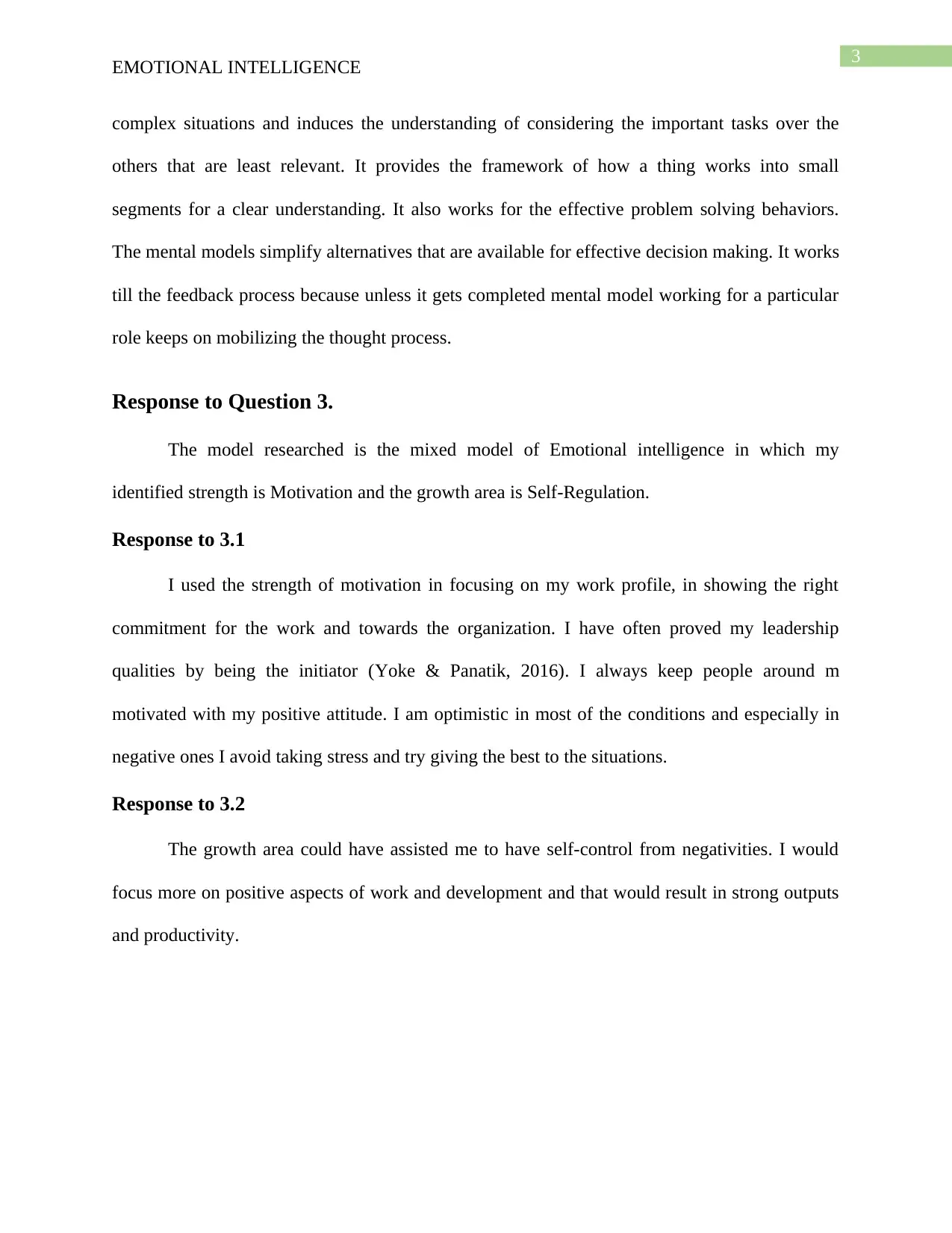
3
EMOTIONAL INTELLIGENCE
complex situations and induces the understanding of considering the important tasks over the
others that are least relevant. It provides the framework of how a thing works into small
segments for a clear understanding. It also works for the effective problem solving behaviors.
The mental models simplify alternatives that are available for effective decision making. It works
till the feedback process because unless it gets completed mental model working for a particular
role keeps on mobilizing the thought process.
Response to Question 3.
The model researched is the mixed model of Emotional intelligence in which my
identified strength is Motivation and the growth area is Self-Regulation.
Response to 3.1
I used the strength of motivation in focusing on my work profile, in showing the right
commitment for the work and towards the organization. I have often proved my leadership
qualities by being the initiator (Yoke & Panatik, 2016). I always keep people around m
motivated with my positive attitude. I am optimistic in most of the conditions and especially in
negative ones I avoid taking stress and try giving the best to the situations.
Response to 3.2
The growth area could have assisted me to have self-control from negativities. I would
focus more on positive aspects of work and development and that would result in strong outputs
and productivity.
EMOTIONAL INTELLIGENCE
complex situations and induces the understanding of considering the important tasks over the
others that are least relevant. It provides the framework of how a thing works into small
segments for a clear understanding. It also works for the effective problem solving behaviors.
The mental models simplify alternatives that are available for effective decision making. It works
till the feedback process because unless it gets completed mental model working for a particular
role keeps on mobilizing the thought process.
Response to Question 3.
The model researched is the mixed model of Emotional intelligence in which my
identified strength is Motivation and the growth area is Self-Regulation.
Response to 3.1
I used the strength of motivation in focusing on my work profile, in showing the right
commitment for the work and towards the organization. I have often proved my leadership
qualities by being the initiator (Yoke & Panatik, 2016). I always keep people around m
motivated with my positive attitude. I am optimistic in most of the conditions and especially in
negative ones I avoid taking stress and try giving the best to the situations.
Response to 3.2
The growth area could have assisted me to have self-control from negativities. I would
focus more on positive aspects of work and development and that would result in strong outputs
and productivity.
Paraphrase This Document
Need a fresh take? Get an instant paraphrase of this document with our AI Paraphraser
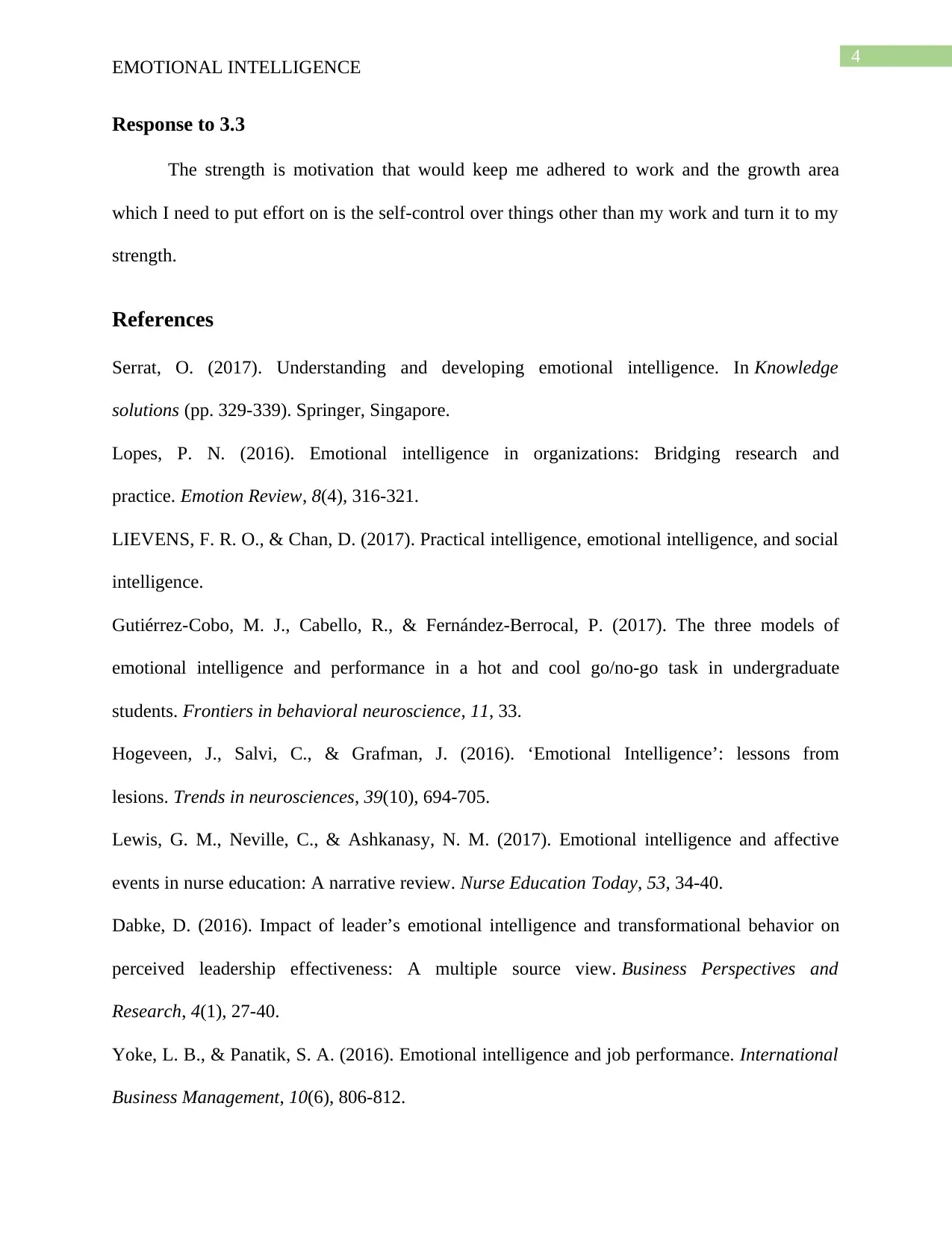
4
EMOTIONAL INTELLIGENCE
Response to 3.3
The strength is motivation that would keep me adhered to work and the growth area
which I need to put effort on is the self-control over things other than my work and turn it to my
strength.
References
Serrat, O. (2017). Understanding and developing emotional intelligence. In Knowledge
solutions (pp. 329-339). Springer, Singapore.
Lopes, P. N. (2016). Emotional intelligence in organizations: Bridging research and
practice. Emotion Review, 8(4), 316-321.
LIEVENS, F. R. O., & Chan, D. (2017). Practical intelligence, emotional intelligence, and social
intelligence.
Gutiérrez-Cobo, M. J., Cabello, R., & Fernández-Berrocal, P. (2017). The three models of
emotional intelligence and performance in a hot and cool go/no-go task in undergraduate
students. Frontiers in behavioral neuroscience, 11, 33.
Hogeveen, J., Salvi, C., & Grafman, J. (2016). ‘Emotional Intelligence’: lessons from
lesions. Trends in neurosciences, 39(10), 694-705.
Lewis, G. M., Neville, C., & Ashkanasy, N. M. (2017). Emotional intelligence and affective
events in nurse education: A narrative review. Nurse Education Today, 53, 34-40.
Dabke, D. (2016). Impact of leader’s emotional intelligence and transformational behavior on
perceived leadership effectiveness: A multiple source view. Business Perspectives and
Research, 4(1), 27-40.
Yoke, L. B., & Panatik, S. A. (2016). Emotional intelligence and job performance. International
Business Management, 10(6), 806-812.
EMOTIONAL INTELLIGENCE
Response to 3.3
The strength is motivation that would keep me adhered to work and the growth area
which I need to put effort on is the self-control over things other than my work and turn it to my
strength.
References
Serrat, O. (2017). Understanding and developing emotional intelligence. In Knowledge
solutions (pp. 329-339). Springer, Singapore.
Lopes, P. N. (2016). Emotional intelligence in organizations: Bridging research and
practice. Emotion Review, 8(4), 316-321.
LIEVENS, F. R. O., & Chan, D. (2017). Practical intelligence, emotional intelligence, and social
intelligence.
Gutiérrez-Cobo, M. J., Cabello, R., & Fernández-Berrocal, P. (2017). The three models of
emotional intelligence and performance in a hot and cool go/no-go task in undergraduate
students. Frontiers in behavioral neuroscience, 11, 33.
Hogeveen, J., Salvi, C., & Grafman, J. (2016). ‘Emotional Intelligence’: lessons from
lesions. Trends in neurosciences, 39(10), 694-705.
Lewis, G. M., Neville, C., & Ashkanasy, N. M. (2017). Emotional intelligence and affective
events in nurse education: A narrative review. Nurse Education Today, 53, 34-40.
Dabke, D. (2016). Impact of leader’s emotional intelligence and transformational behavior on
perceived leadership effectiveness: A multiple source view. Business Perspectives and
Research, 4(1), 27-40.
Yoke, L. B., & Panatik, S. A. (2016). Emotional intelligence and job performance. International
Business Management, 10(6), 806-812.

5
EMOTIONAL INTELLIGENCE
EMOTIONAL INTELLIGENCE
⊘ This is a preview!⊘
Do you want full access?
Subscribe today to unlock all pages.

Trusted by 1+ million students worldwide
1 out of 6
Related Documents
Your All-in-One AI-Powered Toolkit for Academic Success.
+13062052269
info@desklib.com
Available 24*7 on WhatsApp / Email
![[object Object]](/_next/static/media/star-bottom.7253800d.svg)
Unlock your academic potential
Copyright © 2020–2026 A2Z Services. All Rights Reserved. Developed and managed by ZUCOL.



